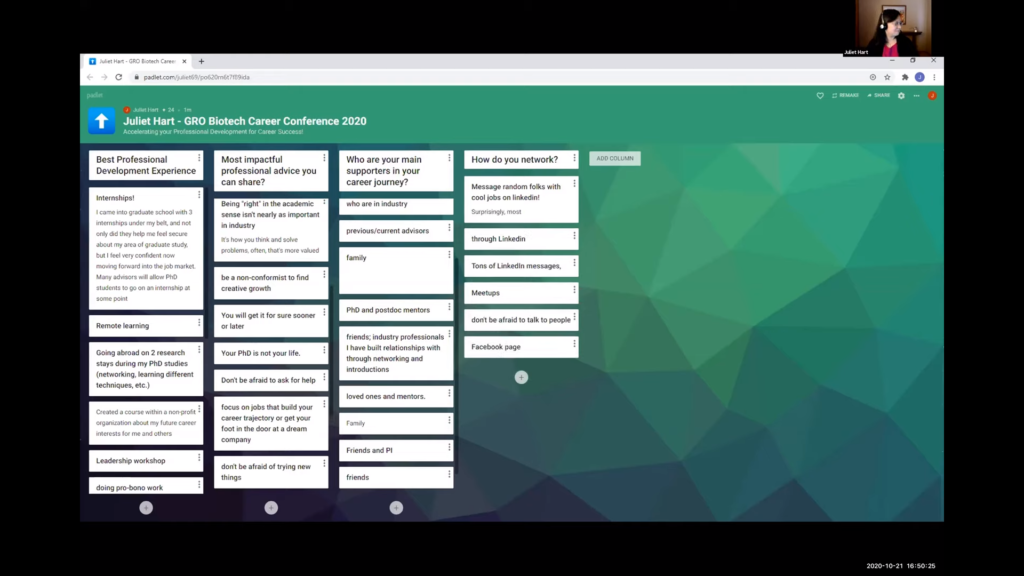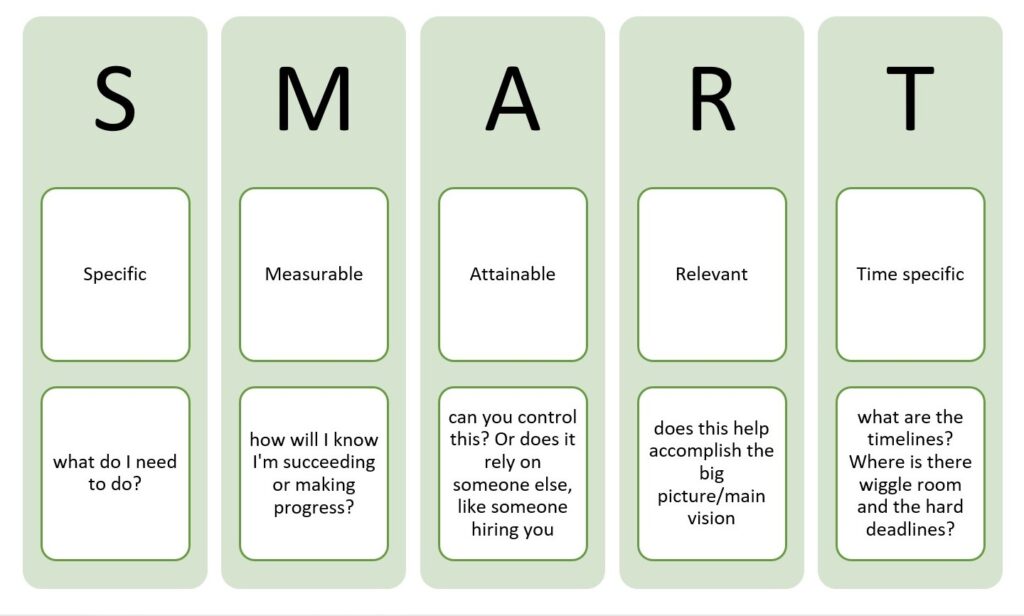By Natalie Losada
Day 2 Session 1:
The GRO-Biotech conference continued into day two with an extremely interactive, engaging session called Career Development Workshop with Juliet Hart. Juliet Hart is a founder and CEO of Hart and Chin, a company that helps scientists develop their interpersonal and leadership skills through personalized coaching/training. Hart and Chin also operates as a consulting firm that can help other companies develop leadership organization and skills to improve collaboration and communication. Hart used to be an R&D scientist for J&J but felt disadvantaged that the experience did not foster any soft skills, so she moved to their HR team. She became passionate about helping people develop skills they could use for any career path, so she left J&J and started Hart and Chin. Now she spends her days coaching scientists to set visions and goals, training students in workshops like this one, and consulting organizations about their plans by studying the trends of the industry.
Her workshop covered a myriad of important topics to help you determine what you want or need in your career journey. During the workshop, participants were able to learn networking skills, understand why you should know your mission and goals, develop awareness of learning techniques and how to implement them, and work on goal setting.
Commentary on a Very Interactive Intro:
Juliet Hart’s workshop was a refreshing change of pace from simple lecture style career workshops. The session began with some lighthearted discussion with the Zoom polling feature while attendees were trickling into the meeting. When she began her presentation, she first displayed a color wheel of emotions and asked everyone to simply share how they were feeling in the chat. The chat was flooded with emotions: worried, free, hopeful, anxious, excited, nervous, depressed, inquisitive, and more. I was not very surprised everyone shared their feelings, because she was able to create such a safe and caring atmosphere right off the bat.
Networking
Subsequently, Juliet Hart began her first major topic of the workshop by asking about the participants’ backgrounds; most were grad students and postdocs, but there were also some in the work force. She was pleased and emphasized the diversity of the attendees in the session. Virtual events, like this workshop, give you the opportunity to meet new people and grow your network. Carving out time for these events, and more importantly, talking to individuals during and after these events, is vital because companies like to hire people they know. Hart encouraged everyone to contact other attendees after the workshop to start practicing their networking skills. Whether you’re interviewing or networking, you need to project confidence and a willingness to engage. She emphasized that without engagement, you won’t be able to make an impact on someone. Getting to know people in a virtual world is possible, it is just a much slower process, so you need to allocate more time. Hart adds that “sending a random resume with no referral is not good enough in this virtual environment.”
Why should you know your mission, vision, and goals? For effective communication.
One important benefit of networking is landing a job, but that benefit is reaped in the long-term. No one is asking for a job the minute they meet someone; that’s not networking. The action of networking involves getting to know people and understanding what they want or have to offer, while effectively communicating what you want and have to offer. If you can become an expert in effectively communicating your interests and strengths, your network will be better equipped to help you throughout your career.
Floating quote; One important benefit of networking is landing a job, but that benefit is reaped in the long-term.
Understanding what you want or need from your career starts with introspection. What is your mission? What is your vision? Hart asked these questions to the attendees and expressed how different these two questions are. An example of a mission is: I want to land a job at a pharma company in 2021. In contrast, a vision would be: I wish to work at a company that has my same values and have a job that motivates me. A mission is some task you want to accomplish, while a vision is a desire that will bring you long-term joy. It is important to ask these questions to yourself so that you can understand the full scope of your wants and needs from your career. If you want to lead a team or you want someone to lead you, a solid mission/vision are needed to effectively communicate to others and motivate them. Fear and conflict manifest from ambiguity, so the more you understand yourself, the more confident you’ll be and the better you’ll communicate.
Floating quote: “Fear and conflict manifest from ambiguity, so the more you understand yourself, the more confident you’ll be and the better you’ll communicate.”
What can you offer? Think of different types of learning:
As was briefly mentioned above, while networking, you want to communicate your mission, vision, and your value. You may not realize, but you have more strengths and more knowledge than what is mentioned in your academic transcript. Below are the main types of learning that Juliet Hart shared during the workshop.
Formal: a class or course. These can include online certificate programs, like those offered on Coursera, and can be added to your resume if the certificate is relevant to the job for which you are applying. Hart added “assume that everything on your resume will start a conversation, so only put what is relevant to the job and what you are prepared to talk about.” A resume does not need your entire history or every class or course – you can use a CV for that.
Non-formal: seminars, workshops, volunteering, shadowing. Juliet Hart explained that we frequently underestimate their impact. “you forget how it built you into the unique person you are.”
Informal: unconscious learning. This involves the challenges faced outside of a formal or non-formal learning environment. Situations that make you think creatively and spontaneously can teach you more than you think.
Self-directed: This method is not ideal for everyone or for every type of skill. For example, this method works great for any hard skills, but isn’t as effective for soft skills, which require a constant feedback loop from others. But if you’d like to try it out, here are the steps:
- Identify your knowledge deficits
- Set goals for learning
- Create efficient strategies
- Monitor yourself and your progress
- Modify the approach if needed
- Reach your goal
Juliet Hard admitted this is a hard way to learn and urged everyone not to worry if it doesn’t work. As Winston Churchill said, “I am always ready to learn although I don't always like being taught.”
Collaborative: combining and curating the knowledge of a group of people. Juliet Hart wanted to show this learning method in action, so she implemented an online tool called padlet.com that allows anyone with the website link to access a virtual desk that is full of notepads with questions. Everyone can anonymously add comments or pictures or links to a notepad (see screenshots below) or ask their own notepad question. This was a marvelous tool to get a large group to interact and share their knowledge without any interruptions or pressure of speaking in a large crowd.

Screenshot of workshop with Juliet Hart. This is a screen share of the Padlet.com platform with this topics of discussion for the collaborative learning activity.
Furthermore, all your experiences have the potential to teach you skills you can and will use in your career, and you must use them to craft a story and paint a picture of yourself for interviewers. Consider all the qualities an interviewer looks for that you have learned and be intentional about using those experiences to portray all your strengths. “We’re all just a story…just trying to get to know each other”, Hart added poetically.
Setting your goals:
Once you understand what you have to offer and you know your mission and vision, you are ready to set up your goals. Your goals will be the steppingstones to leading to your mission and vision, and these goals need to be SMART:

SMART goals components, image made by Natalie Losada, description of SMART goal components from Juliet Hart during the workshop.
A bad example of this would be: ask for informational interviews about potential jobs of interest. This is not specific, not measurable, and has no timeline. Try thinking about it this way: if this is something you would quickly scratch on your to-do list next to “buy milk”, it’s not a SMART goal. On the other hand, a good example would be: identify nine people for informational interviews for three types of jobs in next two weeks, schedule time with them, and decide after each interview which job I will pursue. Notice how much longer this goal is – if a lot of thought went into planning the goal, that’s a good sign that you’re planning a SMART goal.
Additionally, there are three different types of goals. They should all be SMART goals, but they have different timelines and purposes and you should at least one of each. They are:
- Quick-win goal - confidence builders
- Long-term goal - the bigger picture
- Stretch goal - the challenge to push yourself and test your limits – if you don’t accomplish it, you will still learn, but if you do accomplish it, you know your new limits
In conclusion, this fun, interactive workshop led by Juliet Hart provided insightful advice on how you can organize your efforts to produce an efficient career development plan. Her advice boils down to a few steps: know yourself, communicate your mission and goals, leverage your network (including social media), and build a strong support system (mentors, advisors, coach, PI/Manager, peer, role model) to hit the ground running.
Juliet Hart added one final bit of advice that she noticed worked well for colleague: Be laser focused on your goal - use everything above and you will get there efficiently.
This article was edited by Junior Editor Rukia Henry and Senior Editor Samantha Avina.